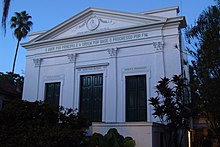人道教
外观


人道教(法語:Religion de l'Humanité;或église positiviste)是实证主义哲学的创始人奥古斯特·孔德(1798–1857)创立的一种世俗宗教。该宗教的信徒在法国和巴西建造了人道教礼拜堂。[1] 。
在美国和欧洲,孔德的思想影响了其他人,并促成了伦理学会和“伦理教会”的出现,从而导致了伦理文化、宗教人文主义和世俗人文主义组织的发展。
起源
孔德为实证主义学会创立了人道教,希望取得传统宗教所具有的凝聚力。孔德与克洛蒂尔德·德沃(Clotilde de Vaux)两人发生柏拉图式恋爱,1846年克洛蒂尔德·德沃去世,孔德将其理想化。他确信女性价值观体现了情感和道德的胜利。在未来以科学为基础的实证主义学会中,也应该有一种宗教 能够凭借道德力量而拥有力量。[2] 1849年,他提出了一项历法改革,名为“实证主义日历”(positivist calendar),每个月份以历史上最伟大的领袖、思想家和艺术家的名字命名,每天都纪念一位思想家。
参考
- ^ Où peut-on visiter un temple positiviste ? (Where Are Positivist Shrines to be Seen?). [2007-10-30]. (原始内容存档于2007-10-30) (法语).
- ^ Rollin Chambliss, Social Thought: From Hammurabi to Comte, Dryden Press, New York, 1954, p.424.
外部链接
- Positivist Church of Brazil//Encyclopedia of Latin American History and Culture (页面存档备份,存于互联网档案馆)
- English language site for Brazil's "Religion of Humanity"
- Olaf Simons, The Religion of Humanity (a structured collection of transcripts from English translations of Comte's major publications on the topic) (页面存档备份,存于互联网档案馆)
- The Catechism of Positive Religion, Auguste Comte 1858
